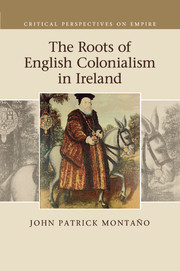2 - Planning a landscape I
cultivation as reformation
Published online by Cambridge University Press: 05 February 2012
Summary
By the early sixteenth century, English officials tasked with restoring order in Ireland established a definite link between reforming the people and transforming the land. With the widespread acceptance of the barbarity of Irish customs and society in the medieval period, it should come as no surprise that an assault on native culture was spearheaded by elimination of the most important marker of a primitive society: its members’ commitment to living as “a rural dweller rather than a town dweller and a follower of a barter economy rather than a user of coins, and – worst of all – a pastoralist rather than a cultivator of fields.” Each of these faults had been exacerbated during the Irish revival of the fourteenth century that was a consequence, in part, of the failure of most of the great magnate families to produce the necessary male heirs, but also of the inability of the medieval settlers to find sufficient numbers to inhabit the territory or to defend what they claimed, thereby creating a void that the natives were eager to occupy. The resulting violence of this power vacuum forced settlers to maintain armed retinues to defend their interests, but this could not prevent their influence from being reduced to a narrow strip of territory with Dublin at its center. Worse still, these private forces were one more example of settler magnates having to adopt the Irish traditions that officials and Palesmen had condemned so roundly soon after their arrival in the country. As early as 1297 an Ordinance had complained of the English renouncing English laws and customs, embracing Irish ones, raiding their neighbors, holding negotiations outdoors in the Irish fashion, speaking Irish, and fostering their children “so that they may drink in, love and use the Irish language.”The much-feared degeneration of English magnates caused increasing numbers of the crucial settler population to abandon their lands and return to England, or at the very least to retreat to the relative safety of the Pale, further reducing the civil presence in the countryside. Worse still, the lordship had once been a source of profit to the crown, but this ended with the Bruce invasion of 1315 and all efforts to restore civility and profitability to Ireland failed.
- Type
- Chapter
- Information
- The Roots of English Colonialism in Ireland , pp. 64 - 102Publisher: Cambridge University PressPrint publication year: 2011
- 1
- Cited by

